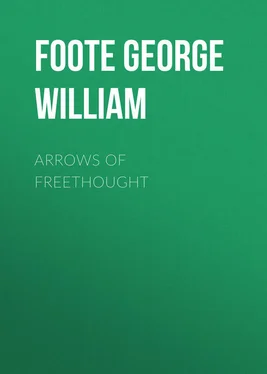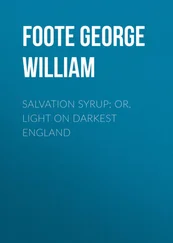George Foote - Arrows of Freethought
Здесь есть возможность читать онлайн «George Foote - Arrows of Freethought» — ознакомительный отрывок электронной книги совершенно бесплатно, а после прочтения отрывка купить полную версию. В некоторых случаях можно слушать аудио, скачать через торрент в формате fb2 и присутствует краткое содержание. Жанр: foreign_antique, foreign_prose, на английском языке. Описание произведения, (предисловие) а так же отзывы посетителей доступны на портале библиотеки ЛибКат.
- Название:Arrows of Freethought
- Автор:
- Жанр:
- Год:неизвестен
- ISBN:нет данных
- Рейтинг книги:5 / 5. Голосов: 1
-
Избранное:Добавить в избранное
- Отзывы:
-
Ваша оценка:
- 100
- 1
- 2
- 3
- 4
- 5
Arrows of Freethought: краткое содержание, описание и аннотация
Предлагаем к чтению аннотацию, описание, краткое содержание или предисловие (зависит от того, что написал сам автор книги «Arrows of Freethought»). Если вы не нашли необходимую информацию о книге — напишите в комментариях, мы постараемся отыскать её.
Arrows of Freethought — читать онлайн ознакомительный отрывок
Ниже представлен текст книги, разбитый по страницам. Система сохранения места последней прочитанной страницы, позволяет с удобством читать онлайн бесплатно книгу «Arrows of Freethought», без необходимости каждый раз заново искать на чём Вы остановились. Поставьте закладку, и сможете в любой момент перейти на страницу, на которой закончили чтение.
Интервал:
Закладка:
In reviewing Mr. Edward Smith's "Life of Cobbett," our principal literary paper, the Athenæum, in its number for January 11th, went out of its way to defame Paine's character. This is what it said: —
"A more despicable man than Tom Paine cannot easily be found among the ready writers of the eighteenth century. He sold himself to the highest bidder, and he could be bought at a very low price. He wrote well; sometimes he wrote as pointedly as Junius or Cobbett. Neither excelled him in coining telling and mischievous phrases; neither surpassed him in popularity-hunting. He had the art, which was almost equal to genius, of giving happy titles to his productions. When he denounced the British Government in the name of 'Common Sense' he found willing readers in the rebellious American colonists, and a rich reward from their grateful representatives. When he wrote on behalf of the 'Rights of Man,' and in furtherance of the 'Age of Reason,' he convinced thousands by his title-pages who were incapable of perceiving the inconclusiveness of his arguments. His speculations have long since gone the way of all shams; and his charlatanism as a writer was not redeemed by his character as a man. Nothing could be worse than his private life; he was addicted to the most degrading of vices. He was no hypocrite, however, and he cannot be charged with showing that regard for appearances which constitutes the homage paid by vice to virtue. Such a man was well qualified for earning notoriety by insulting Washington. Only a thorough-paced rascal could have had the assurance to charge Washington with being unprincipled and unpatriotic. Certainly Mr. Smith has either much to learn, or else he has forgotten much, otherwise he could not venture to suggest the erection of a monument 'recording the wisdom and political virtues of Thomas Paine.'"
Now we have in this tirade all the old charges, with a new one which the critic has either furnished himself or derived from an obscure source – namely, that Paine "sold himself to the highest bidder." Let us examine the last charge first. The critic curiously contradicts himself. Paine, he admits, could "sometimes write as pointedly as Junius or Cobbett," whose works sold enormously, and he had the art of devising happy titles for his productions; yet, although he sold himself to the highest bidder, he could be bought at a very low price! The fact is, Paine was never bought at all. His was not a hireling pen. Whatever he wrote he put his name to, and he never parted with the copyright of any of his works, lest the Government or some friend of despotism should procure their suppression. He also published his writings at a ridiculously low price, so low indeed that he lost by them instead of gaining. Of his "Common Sense," that fine pamphlet which stirred the American colonists to battle against their oppressors, not less than a hundred thousand copies were sold; yet he found himself finally indebted to his printer £29 12s. 1d. Fifteen years later the English Government tried through the publisher to get the copyright of the "Rights of Man;" but though a large sum was offered, Paine refused on principle to let it pass out of his own hands. The first part of this work was published at a price which precluded any chance of profit; the publication of the second part caused him to be tried and condemned for treason, the penalty of the law being escaped only by flight. All publication of his works, whether political or religious, was afterwards illegal. Thousands of copies were circulated surreptitiously, or openly by men like Richard Carlile, who spent nine years in prison for his sale of prohibited books. But clearly Paine could derive no profit from this traffic in his works, for he never set foot in England again. Thomas Paine wrote in order to spread his political and religious views, and for no other purpose. He was not a professional author, nor a professional critic, and never needed payment for his literary work. And assuredly he got none. Let the Athenæum critic inform the world to whom Paine sold himself, or who ever paid him a penny for his writings. Until he does so we shall believe that the author of "Common Sense," the "Rights of Man," and the "Age of Reason," was honest in saying: "In a great affair, where the good of mankind is at stake, I love to work for nothing; and so fully am I under the influence of this principle, that I should lose the spirit, the pride, and the pleasure of it, were I conscious that I looked for reward."
Popularity-hunting, to use the critic's graceless phrase, was Paine's next fault; but as, according to the same authority, he was guilty in this respect only in the same sense as Junius was, the burden of his iniquity cannot be very great.
Addiction to the most degrading of vices, is a charge difficult to confute until we know specifically what vice is meant. Paine has been accused of drunkenness; but by whom? Not by his intimate acquaintances, who would have detected his guilt, but by his enemies who were never in his society, and therefore could know nothing of his habits. Cheetham, who first disseminated this accusation, was a notorious libeller, and was more than once compelled to make a public apology for his lies; but he was a shameless creature, and actually in his "Life" of Paine resuscitated and amplified falsehoods for which he had tendered abject apologies while his victim was alive. Even, however, if Paine had yielded to the seductions of strong drink, he should be judged by the custom of his own age, and not that of ours.
Mr. Leslie Stephen does not rail against Boswell for his drinking powers; Burns is not outlawed for his devotion to John Barlycorn; Byron and Sheridan are not beyond pardon because they often went drunk to bed; and some of the greatest statesmen of last century and this, including Pitt and Fox, are not considered the basest of men because they exercised that right which Major O'Gorman claims for all Irishmen – "to drink as much as they can carry." But no such plea is necessary, for Paine was not addicted to drink, but remarkably abstemious. Mr. Fellows, with whom he lived for more than six months, said that he never saw him the worse for drink. Dr. Manley said, "while I attended him he never was inebriated." Colonel Burr said, "he was decidedly temperate." And even Mr. Jarvis, whom Cheetham cited as his authority for charging Paine with drunkenness, authorised Mr. Vale, of New York, editor of the Beacon , to say that Cheetham lied . Amongst the public men who knew Paine personally were Burke, Home Tooke, Priestley, Lord Edward Fitzgerald, Dr. Moore, Jefferson, Washington, Volney and Condorcet: but none of these ever hinted at his love of drink. The charge of drunkeness is a posthumous libel, circulated by a man who had publicly quarrelled with Paine, who had been obliged to apologise for former aspersions, and who after Paine's death was prosecuted and condemned for libelling a lady whom he had accused of undue familiarity with the principal object of his malice.
Finding the charge of drunkenness unequivocally rebutted, Paine's traducers advance that of licentiousness. But this is equally unsuccessful. The authority relied on is still Cheetham, who in turn borrowed from a no less disreputable source. A man named Carver had quarrelled with Paine over money matters; in fact, he had been obliged with a loan which he forgot to pay, and like all base natures he showed his gratitude to his benefactor, when no more favors could be expected, by hating and maligning him. A scurrilous letter written by this fellow fell into the hands of Cheetham, who elaborated it in his "Life." It broadly hinted that Madame Bonneville, the by no means youthful wife of a Paris bookseller who had sheltered Paine when he was threatened with danger in that city, was his paramour; for no other reason than that he had in turn sheltered her when she repaired with her children to America, after her home had been broken up by Buonaparte's persecution of her husband. This lady prosecuted Cheetham for libel, and a jury of American citizens gave her a verdict and damages.
Читать дальшеИнтервал:
Закладка:
Похожие книги на «Arrows of Freethought»
Представляем Вашему вниманию похожие книги на «Arrows of Freethought» списком для выбора. Мы отобрали схожую по названию и смыслу литературу в надежде предоставить читателям больше вариантов отыскать новые, интересные, ещё непрочитанные произведения.
Обсуждение, отзывы о книге «Arrows of Freethought» и просто собственные мнения читателей. Оставьте ваши комментарии, напишите, что Вы думаете о произведении, его смысле или главных героях. Укажите что конкретно понравилось, а что нет, и почему Вы так считаете.











